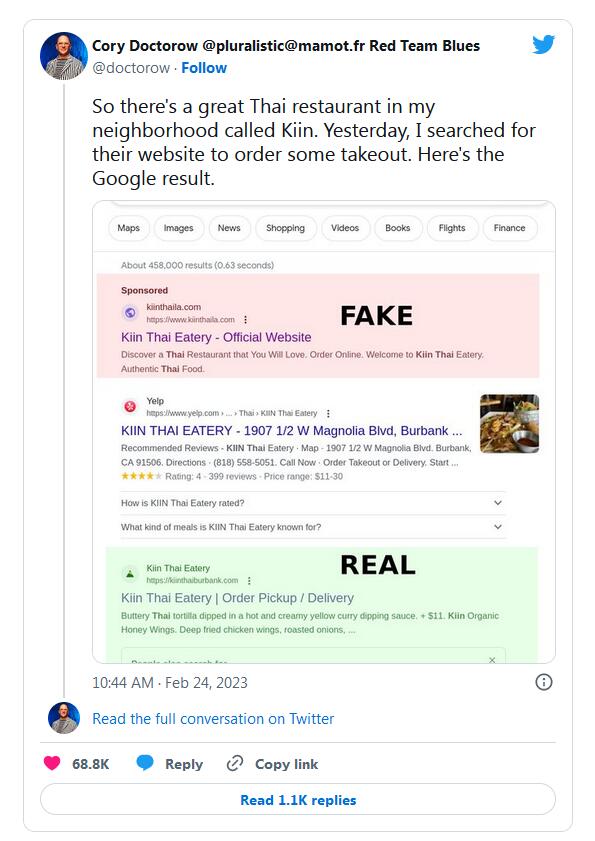We all use Google, so we’re all accustomed to Google’s peculiarities, with sponsored links being among the most prominent. These links are displayed on the front page of any Google search, based on the person who is paying the highest to get them there. While these links could be largely unrelated to the topic you’re searching for, there are times when they’re in the right direction. But, if it appearslike an advertisement, if it applies to your particular search, you shouldn’t click it. It could be an untruth.
The most recent example of this unsavory use of Google Ads comes to us via Twitter. The author Cory Doctorow tweeted about his experience when attempting to make a takeout purchase at an area Thai restaurant. When Doctorow looked up his restaurant’s name, Kiin Thai Eatery, He clicked on the first result to pop up, which turned out to be an affiliate link.
What’s the point? A link is just one thing. This is unless somebody has snuck into an identity for the establishment, and that’s precisely the case in this instance.

The link took him to a site that claimed as Kiin Thai Eatery, inviting Doctorow to make an order. Doctorow did so, and he took payment for the meal but was contacted to Kiin Thai Eatery shortly after. The restaurant advised Doctorow that they received an order, but it was from a scammer known to the public. The scammer created an unauthentic website that resembled the menu of Kiin Thai Eatery. They increasing the price to 15% and then placed an order at the actual restaurant’s name under Doctorow’s name hoping that no one would be able to notice.
Fortunately, Kiin Thai Eatery did it, and then canceled the order. However, Doctorow was in the ring for the fees–plural, as scammers double-charged Doctorow for the fake purchase. Doctorow’s experiences raise two important questions What is the reason American Express issue a merchant license to fraudsters using an Wix numbers, instead of the official number for business? Why would Google provide the scammers with an ad-sponsored card that was already available for the restaurant?
These fraudsters reveal an dark realm of micro-stealing. The unsuspecting customer makes a mark-up payment via a dubious middle-man who in turn forwards the payment to the real merchant, who then takes the extra money off of the top of their own pockets. It’s true, as Doctorow points out that it’s hardly different than what food delivery services provide. Of course, you’ve never agreed to place an order through these fraudsters.
This kind of fraud is not new. According to an Which? investigation that began in 2020, fraudsters may create fake business ads that appear on Google “within days,” starting with a fake business page on Facebook before moving to the next step. It’s not just fake companies you should be on the lookout for: Bad actors will also infuse Google Ads with malware and infect your computer when the click a URL you believe to be legitimate and trustworthy.
In the end, Google doesn’t seem inclined to resolve this issue any time in the near future. It doesn’t help The best option is to steer clear of sponsored hyperlinks (and other advertisements) entirely. It’s a good idea to use Google for your searches however: often, these links don’t match the ones you’re looking for or in the event that they are, they can lead users towards “deals” and other sites that you don’t want to visit. Make sure to scroll down every time you search, and you don’t need to be concerned about supporting an unscrupulous person.






